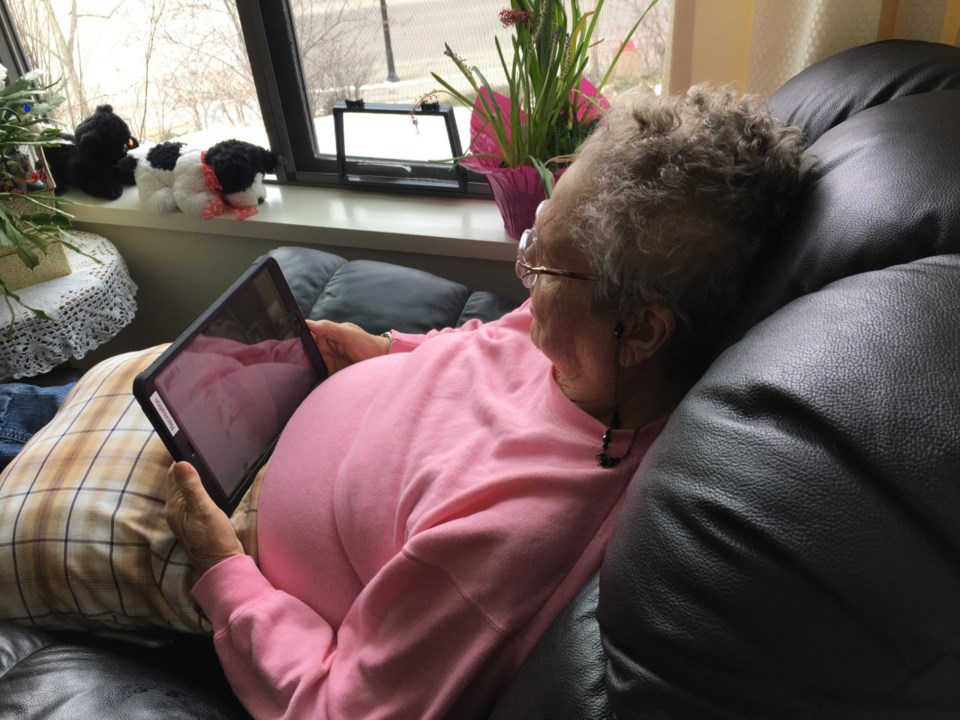When seniors are placed in complex care facilities to meet their growing needs, it may feel more isolating than they've experienced in most other times in their lives.
During the coronavirus pandemic that sees social distancing and isolation taking place as protective measures for those most vulnerable seniors residing in facilities, people can't visit with family and friends the way they used to.
In Prince George the complex care facilities are Gateway, Rainbow, Jubilee and Parkside.
Within those walls, recreational therapists have been spending more one-on-one time with residents and offering virtual visits with loved ones.
"It's definitely been more of a challenge," Lynn AuCoin, recreational therapist for complex care facilities in Prince George, said. "I feel it's a real honour to be part of these virtual visits as residents are connecting with family members. There's been some pretty emotional and special moments that have come out of those virtual visits."
One-on-one time spent with residents has seen staff spending time on personal grooming.
"And that is so client-centred," AuCoin said. "We're all looking a little disheveled to some degree with us not being able to get to our hairdressing appointments and that's no different for our clients here so yesterday a couple of my staff took some time to go around and curl hair and that kind of thing. So a few of our residents are looking magnificent. Just doing that little thing makes a huge difference to the mindset and makes you feel a little bit special."
AuCoin said in seniors' facilities most recreational activities are done in groups but during these times of social distancing to keep everyone safe residents and staff are not used to that.
"But now is not the time to be doing group activities so right now we're really focusing on those one-to-ones and hand hygiene - we've all upped our game for hand hygiene with residents and staff and we're wiping surfaces. Safety is first and foremost and then we're looking at what activity we can do with residents, whether it's reminiscing or setting them up with a special video or movie that really means a lot to them, those kinds of activities for sure."
To help make the transition for different ways to connect loved ones to residents to keep the most vulnerable of the population safe from COVID-19, there's been communication with each resident's contact person to discuss what works best.
Some residents would receive daily or weekly in-person visits with family members. Other residents get regular phone calls from their families that continue through this time.
Opportunities are given to do Skype or Facetime with family members and also each complex care facility has its own email box specifically geared for the residents so family can send along their email messages. These messages are then passed along to the residents either by printing them off so the resident can read the message or staff will read the message to the resident.
"We can bump up the font to the size a resident requires to read the letter themselves if they have a visual impairment and if a resident has memory impairment we can leave the letter with that resident and we often see them go to the letter like it's just been delivered to them and for those residents it's like that special moment gets relived and that's a good thing."
After messages are delivered and a resident is able to give a response back, staff make sure to send a response on their behalf or at least send a message to the sender that the message has been delivered to the resident, AuCoin said.
If a resident has the capacity to do a virtual visit, that is also offered.
"We've found out a lot of our folks do, so we've been quite busy getting those virtual visits organized," AuCoin said. "The virtual visits have been amazing and I have been present for a few of those visits and they are just amazing. I had one lady who was pretty much hugging the iPad when her daughter was on the iPad - it made me tear up - I will be completely honest - it was so emotional and then she was stroking her daughter's hair and the daughter said that is something that her mother does when they visit in person. So it was really neat to see her do that on the iPad. So these virtual visits are going incredibly well."
This new development could possibly be carried into the future with families members living away from their loved one in residence at a care facility connecting virtually on a regular basis, AuCoin added.
"It's always best when people can come in for an in-person visit," AuCoin said. "It's so nice for those folks living far away to see their loved one on the other side of the screen and know that they're doing OK. I can totally see a place for virtual visits when this is all said and done."
Rest assured the recreational therapists understand that some of these visits might be confusing or upsetting to some residents who have some form of dementia or other form of mental impairment who might not understand the virtual visit and social workers are at the ready to support the resident who might have trouble processing the experience.
"So if we do upset someone we do have a plan in place to help with the emotional impact," AuCoin said. "We could also upset the family as well - not just the resident. People naturally want to hug and care for their family member who is upset and virtual visits make that impossible to do. So can take care of the resident for them."



